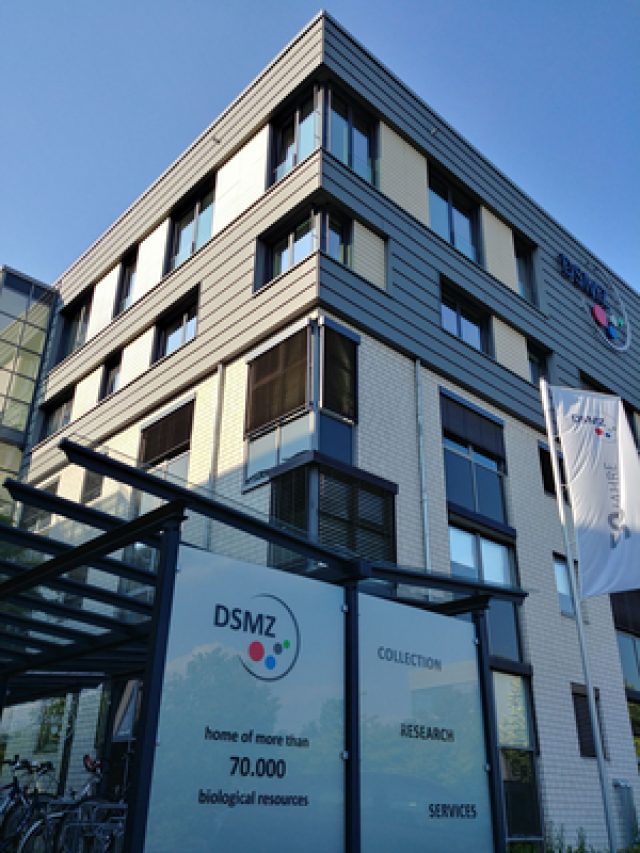- Collection name: Leibniz Institute DSMZ-German Collection of Microorganisms and Cell Cultures GmbH
- Acronym: DSMZ
- WDCM number: 274
- Institution: Leibniz Institute DSMZ-German Collection of Microorganisms and Cell Cultures GmbH
- Address:
Inhoffenstraße 7 B
38124 Braunschweig
Germany
- Website: http://www.dsmz.de
Website of the catalogue or database of the collection: https://www.dsmz.de/collection/catalogue
LinkedIn: https://www.linkedin.com/company/12610502
Facebook: @Leibniz.DSMZ
Instagram: dsmz_leibniz
Bluesky: @leibniz-dsmz.bsky.social - Correspondence data: E-mail: press@dsmz.de
Tel.: +49 (0) 531-2616-300
Correspondent: PhDr. Sven-David Müller (Head of Press and Communication)
Members holdings
Group(s) of biological resources stored in the collection: bacteria, archaea, cyanobacteria, yeasts, filamentous fungi, oomycota, other fungus-like organisms, plasmids (including plasmid bearing strains), animal cells including human and hybridoma cell lines, plant viruses, bacteriophages, eukaryotic algae, protozoa, bacterial genomic DNA, other genomic DNA, other: antisera (plant viruses).
The Leibniz Institute DSMZ is the most diverse biological resource center in the world and one of the largest collections of microorganisms and cell cultures worldwide. With the availability of 80 percent of all formally described bacterial species, the DSMZ hosts the majority of bacterial diversity as well as a globally unique stock of human and animal cell lines, fungal strains, plant viruses, bacteriophages and genomic bacterial DNA for research purposes. The DSMZ is both an active collection and a research institute.
The DSMZ hosts more than 91,000 bioresources, most of them available from the open collection. The DSMZ collections currently comprise about 39,500 bacteria, 790 Archaea, 9,900 fungi and yeasts, 1,400 bacteriophages, 970 plant viruses plus antisera, and 950 human and animal cell lines, and more than 23,000 different types of bacterial genomic DNA. Only biological material of risk group 1 and 2 is accepted. The DSMZ continuously expands its Digital Collection via the DSMZ Digital Diversity platform (https://hub.dsmz.de): free accessible and curated digital information about living organisms (genomic, biochemical, physiological and biogeographic data for bioresources). This data platform provides an integrated resource and allows to link and comprehensively analyse the different types of scientific data from all domains of life sciences.
The German Collection of Microorganisms and Cell Cultures has been a member of the Leibniz Association since 1996 and plays a key role in the national and international biological research community. As a Leibniz Institute, the non-profit DSMZ is supported by the State of Lower Saxony and funded by the Federal Government and the German states.
The DSMZ was the first "Registered Collection" under the EU Regulation 511/2014 for the Nagoya Protocol and is the only recognized international depositary in Germany under the Budapest Treaty. The processes carried out at the Leibniz Institute DSMZ are certified according to various independent procedures including ISO/TC 276 Biotechnology, DIN EN ISO 9001 and OECD "Best Practice Guidelines for Biological Resource Centres". In addition, the Plant Virus Department is accredited according ISO 17034. In 2022, the DSMZ received the GMP certification for the identity verification of phage investigational drugs for the use in humans, according to §64 section 3f of the German Medicines Act.
Services offered
Research
The research focus of the almost 100 scientists at the DSMZ are the various aspects of biodiversity in prokaryotes and eukaryotes. This includes access to novel bioresources by innovative cultivation approaches and cryoconservation techniques as well as targeted research related to systems and evolution, functional diversity and pathobiology. Microbiologists investigate the relevance of microorganisms for biogeochemical, ecological, and biotechnological processes and the potential of biological material for its application in human medicine and biotechnology. Plant virus experts support the production of healthy plants and seeds free of viruses and safeguard the exchange of germplasm across borders and continents. Related to eukaryotic research, DSMZ scientists focus on various aspects of cell culture technology, carcinogenesis and the use of cell lines as model systems for various neoplastic entities and genetic diseases. Data scientists develop the DSMZ Digital Diversity platform that correlates all data and make it accessible to the scientific community. For more information, e.g on current research projects, visit www.dsmz.de/research.
Quality Management System
The DSMZ is certified by DIN EN ISO 9001-2015. The DSMZ Plant Virus Department is accredited as producer of reference materials according to DIN EN ISO 17034:2017. In addition, the DSMZ received the GMP certification for the identity verification of phage investigational drugs for the use in humans, according to §64 section 3f of the German Medicines Act.

